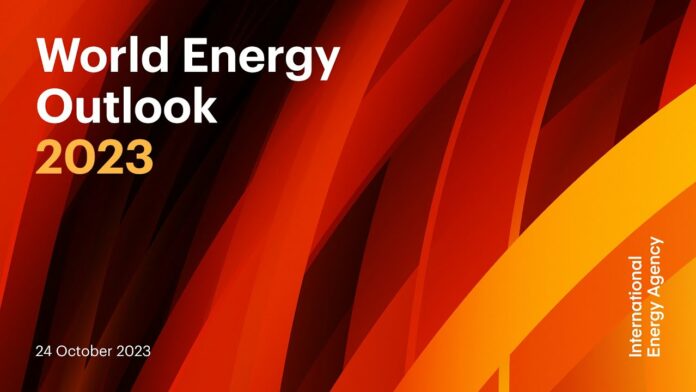International Energy Agency
The International Energy Agency (IEA) has recently unveiled its World Energy Outlook for 2023, providing a detailed analysis of current energy trends and projections for the next decade.
As nations grapple with the urgent need to transition to more sustainable energy sources, this report comes at a pivotal time, highlighting the expected growth in electric vehicles, and renewable energy, and the implications of current investment strategies. Delving into three key scenarios, the IEA paints a comprehensive picture of the potential trajectories for global energy generation and consumption.
World Energy Outlook 2023
Summary:
- Key Takeaways:
- The IEA expects a significant rise in the number of electric vehicles on the road by 2030, with almost ten times the current number.
- The report presents three scenarios based on the Global Energy Climate (GEC) model: the Stated Policies Scenario (STEPS), the Announced Pledges Scenario (APS), and the Net-Zero Emissions (NZE) by 2050 Scenario.
- Under the STEPS scenario, EVs will constitute 40% of global car sales by 2030, up from the current 15%.
- The proportion of renewable energy in the global electricity mix is predicted to rise to 50% by 2030, up from today’s 30%.
Electric vehicles (EVs)
- A notable shift is foreseen with peak demands for coal, oil, and natural gas within this decade and global energy-related CO2 emissions expected to peak by 2025.
- The fossil fuel market share will decrease from its long-standing 80% to 73% by 2030.
- Investment in renewable energy, such as EVs, solar PV generation, and electric heating equipment, is surpassing the investment in fossil fuels.
- In terms of investments, for every dollar invested in fossil fuels in 2023, $1.80 is invested in renewable energy, compared to an equal split five years ago.

Renewable energy
- While investments in renewable energy are rising, stronger policies are essential to limit global warming to the 1.5-degree Celsius target. As of now, projections suggest an average global temperature increase of about 2.4 degrees Celsius within this century.
- Tesla’s Senior VP Drew Baglino highlights the need for even faster transitions to renewable energy.
- Additional Information:
- The report also delves into current geopolitical conflicts in the Middle East, which could impact the security of global energy systems.
- Those interested can access the full report, press releases, or a live stream detailing the report on the IEA’s official channels.
IEA’s World Energy Outlook 2023, here are some inferred benefits:
- Increased Adoption of EVs: With the projection of ten times more electric vehicles on the road by 2030, this will lead to a significant reduction in greenhouse gas emissions and decreased dependency on fossil fuels for transportation.
- Greater Renewable Energy Integration: The expected jump of renewable energy in the global electricity mix to 50% by 2030 means cleaner power generation, less pollution, and reduced greenhouse gas emissions.
- Shift from Fossil Fuels: The potential peak in demand for coal, oil, and natural gas this decade will lead to decreased environmental degradation, lower CO2 emissions, and increased energy security as reliance on depleting fossil fuel reserves reduces.
- Economic Benefits: The continued investment increase in clean energy indicates a booming sector, creating jobs, fostering innovation, and potentially lowering energy costs in the long run.
- Resilient Energy Markets: The decreasing market share of fossil fuels and increasing diversification of energy sources can lead to more stable and resilient energy markets, less vulnerable to supply shocks or geopolitical conflicts.
- Mitigation of Climate Change: The report’s projection that global energy-related CO2 emissions could peak by 2025 is a positive step towards slowing down climate change and its associated risks.
- Increased Investments in Renewables: For every $1 invested into fossil fuels, $1.80 is going toward renewable energy in 2023. This increasing investment momentum indicates stronger financial backing for sustainable technologies, driving innovation and scalability.
- Global Awareness and Policy Impetus: Reports like this drive global awareness, emphasizing the need for stronger policies, which can catalyze action at governmental and industry levels to address climate change challenges.
- Geopolitical Stability: By reducing dependence on fossil fuels, nations can potentially minimize geopolitical conflicts related to energy resources, fostering global stability.
- Feedback for Policymakers: Such reports provide invaluable data and projections that policymakers can use to formulate strategies, prioritize investments, and set actionable targets.
- Promotion of Energy Efficiency: The emphasis on technologies like heat pumps and other electric heating equipment over fossil fuel boilers promotes energy efficiency, which can lead to cost savings and reduced energy consumption.
- Public Engagement: The commentary from influential figures, like Tesla’s Drew Baglino, helps in engaging the public, raising awareness, and driving grassroots action towards sustainable energy solutions.
Conclusion
The report by the IEA emphasizes the changing landscape of energy generation and the growing importance of renewable sources in the global mix. While there are positive trends in the shift towards more sustainable energy sources, there is a clear consensus that further action is needed to meet the global temperature rise targets set by international agreements.
The IEA’s World Energy Outlook 2023 underscores the shifting paradigms in the global energy landscape. While there’s evident momentum towards renewables and sustainable energy sources, the report also sends a clear message about the urgent need for stronger policies to address climate change.
The rising investment in renewables is promising, yet the world remains on a trajectory that could see global temperatures rise significantly. As stakeholders from across sectors delve into the report’s findings, it becomes clear that collective, accelerated action is imperative to safeguard our planet’s future.

































